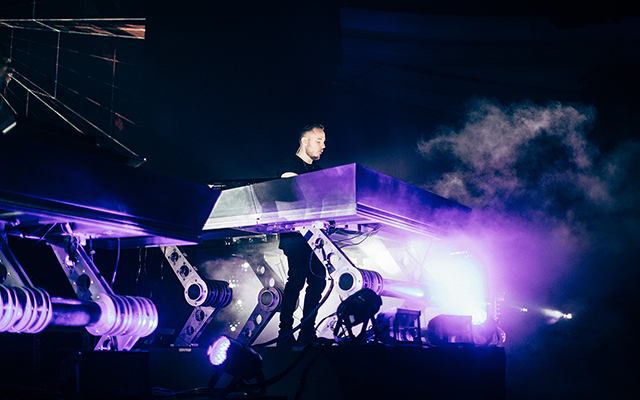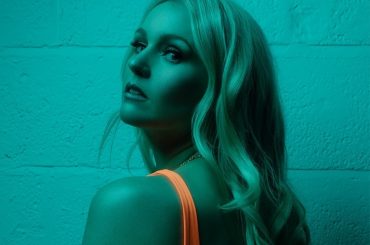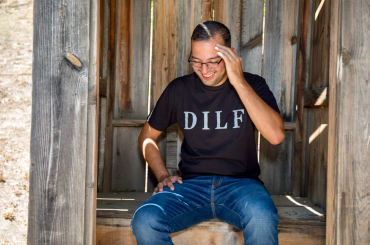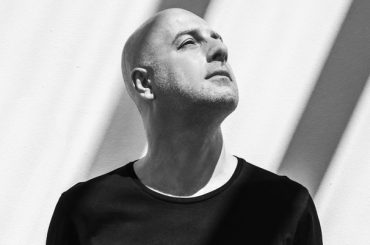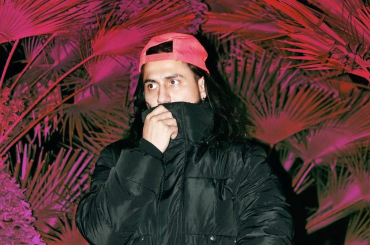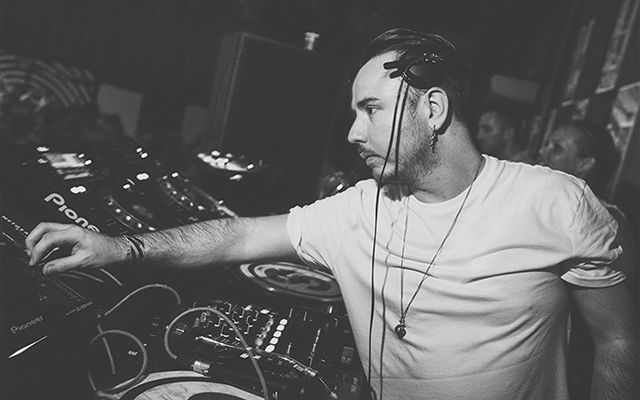
Dumont: Someone who is part of the culture of what they represent. Technically, at a festival, everyone is as good as each other. I can teach anyone the technical side in seven days. What makes it a great DJ is being a figurehead of the niche of dance music you represent and what you do as a figurehead amongst that. What makes an even better DJ is being able to adapt to certain situations and still retain your character. Big festival shows, you know what they expect and it’s hard to be yourself.
DJ Times: How’s that?
Dumont: The good DJs can go into a 200-capacity club and into a 30,000-capacity festival and do the same, but with a completely different set. It’s that understanding. You can play a song in Ibiza and it’ll get a massive reaction; you play it in New York and no one likes it. It fascinates me. I thought a lot of the music I play in Europe wouldn’t have gotten as good a response in America, but it does. I’ve played many venues in the U.S. now that are equal to my favorite venues in Europe. My favorite club in the U.S. is Output in New York. It reminds me of Fabric’s heyday in 2008.
DJ Times: What’s your thought process in the programming of your sets?
Dumont: The first 20 minutes, I will play quite safe. After 20 minutes, I will throw a curveball. Sometimes it reacts, sometimes it doesn’t. If it reacts, then the set goes along a different fork in the road, maybe a heavier, maybe more vocal-based. If that reacts, then it’s a permutation that has infinite results. That’s something I’ve done over 10 years that has tended to work for me. If I don’t throw those curveballs, things get boring very quickly. If you are eclectic and abstract from the start, especially for what I’m known for and the music I come from, that goes over a lot of people’s heads. My favorite set is when I am playing music that nobody knows and people want to know what that music is. I haven’t had a night like that in a long, long time.
DJ Times: Were you a fan like that?
Dumont: What got me into DJing and the culture is when I used to go and see DJs and you would go up and ask what’s that song they’re playing. There used to be a lot more respect in the sense that if that person is up there DJing, they must be good enough and they obviously earned the right to be there. I would never have the audacity to tell the DJ what to play. That’s the most arrogant thing. The culture now is the crowd telling you what songs to play. That’s dangerous. The respect for a good DJ is gone. I don’t think that’s a reflection of dance music, it’s a reflection of culture as a whole, that everything is so accessible and can be personalized.
DJ Times: What were your original forays into DJs, dance music, and club culture?
Dumont: Going out and seeing a lot of local DJs in the northwest of London where I grew up, then going more into London and having access to a larger range of DJs. I remember being 18-years old and in the crowd for DJs like Roger Sanchez, DJ Sneak, and Armand Van Helden. My experience with club music wasn’t through YouTube and SoundCloud. It was by being there and seeing a great DJ doing what they do.
DJ Times: How did that inspire you?
Dumont: That encouraged me to get better at DJing. I had a local DJ gig at a bar down my road. That escalated to playing Fabric, one of the institutions of club music. I played for them for six years, four times a year. That was the real education I had as a DJ, playing at Fabric for so long and so regularly. The quality is so high in places like that, you have to really keep up, be technically great, and be able to read the crowd.
DJ Times: You had a residency at Sankeys Ibiza summer of 2014. How’s that different from other gigs?
Dumont: I flew out to Ibiza every week for 14 weeks. It almost killed me, but I loved it. The nights were a massive success. It was successful because I knew the crowd. Playing a two-and-a-half/three-hour set where you have to take people on a journey goes beyond trying to steal the limelight in an aggressive one-hour set at a festival. Part of me loves that. I want to step onstage and be amongst some of the biggest DJs in the world, but a three-hour Ibiza set is the opposite. It’s the night as a whole, which is my favorite, from the warm-up to the main to the closing act where it all merges into each other. In my 10 years of experience, that’s when I’ve had the most fun DJing.
DJ Times: The North American tour you’re on now is a live show.
Dumont: The first time I did the live show was a small U.K. tour and European tour. Coachella this year was the second incarnation of that tour, which was improved upon and went up a level. The current live show is centered around that. The reason for the live show is, I’m a recording artist with a back catalog. I have 60 minutes of music that can stand up against anybody else in electronic music. I’m going to demonstrate that and have an interaction rather than just mixing those tracks in.
DJ Times: How does the live interpretation play out?
Dumont: There are three of us. Ricky Russell plays percussion and drums—he has a full electronic kit. He’s also triggering samples from the records, but sometimes he’s not because you get weird phasing if you playing the same sounds. The way it’s wired in Ableton, if I flip to another song playing the keyboard, the sounds change so we don’t have to worry about that. He just has his MIDI percussion.
DJ Times: What else?
Dumont: A keyboard player, Okiem Warmann, plays the more complex chords and keyboard parts. I made those in the studio, but he’s better at playing them live. I trigger samples, do effects, and play some keyboard parts. I have a big touchscreen to my right where I can chop and change stems or if I want to jump into a certain track or the next track, I can do that. In front of me is a keyboard with all the samples and sounds. To my left, I have filters and percussion. On a few of the songs I can jump on and play percussion if I need to. And I have alcohol, water, and a towel—the essentials.
DJ Times: Your studio set-up?
Dumont: My home studio is based around Ableton; however, that doesn’t add any magic to my production. If anyone’s reading into this, trying to understand the secrets on how to make music—it doesn’t matter what DAW you use. The only advice I can give anyone is: Build up your sound palette. Everyone thinks the secret is the mixdown. I have a really broad palette of sounds to draw from. It’s like making food—you have the most choice of ingredients.
DJ Times: And your sound palette?
Dumont: It’s a real mix. It can be synth patches from years ago when I was programming stuff from my Yamaha DX100. I have a lot of outboard gear, but I never use it. I am pretty much all in box, however, most of the sounds I use are sampled from waveforms from my outboard gear. I’m not really a big fan of soft synths. There’s a few which do sound great that I’ve used on a lot of records, but I’m a bigger fan of sampling waveforms from an Oberheim and having those on the record.
DJ Times: Why?
Dumont: It’s different and definitely has more warmth. Then again, a lot of the music I’m into at the moment, you can tell is 100-percent soft-synth-based. There is too much focus on that and not enough on musicality. If it’s a great composition, you can make a great song using just sine waves. I try to make music on a computer that doesn’t sound like it’s been made on a computer. That’s my goal.
DJ Times: Any formal music training?
Dumont: None whatsoever. I learned how to compose music by trying to replicate old ’90s R&B records from Blackstreet to Jodeci, what I listened to growing up. I had a keyboard and learned to compose music. I saved up to buy a laptop and that set fire to my inspiration to stay indoors and produce music. I’d study how to produce music online, watch videos, read books, and learn all the techniques.
DJ Times: What’s your process for making tracks?
Dumont: I don’t have a fixed process. The only thing I do, which I felt helps me, is I go through periods where I will write four or five demos in a day, put them in a folder, wake up early the next day, another four demos, put that in a folder. If I’m lucky enough to get three or four days recording that week, in two, three weeks I listen to the folder and decide what to finish. I always find time is the best judge.
DJ Times: Any advice for creating music?
Dumont: You have to write. You have to stop thinking, “This is good, this is bad, I’m going to stop.” Most creatives have the philosophy of: I will work when I am inspired. That’s the most destructive process. Everybody in life has an eight-hour-a-day job. When I get time to spend in the studio, it’s eight hours a day. I get a lot done because of that. Last year, I did 150 shows and made an album. That’s because I worked eight hours a day on music on the days I was home, like a regular job.
DJ Times: Do you have people you produce with?
Dumont: I’m the sole producer. The vision starts with me then whatever means necessary for me to get to the best-sounding record, I will take that route. I never used to have access to that. “Need U (100%)” was me making the entire beat and instrumental on my computer, then working with the vocalist A*M*E. Now my philosophy is… I will delegate to the best people around, but still be completely involved in every step. The best record producers over the last 50 years have been like that. Michael Jackson’s Thriller was 20 people in the studio, all knowing what they’re doing because Quincy Jones was telling them exactly what to do. The best pop music is always made like that.
DJ Times: You worked with Switch some years back.
Dumont: Around 2007, Switch signed me to his label Dubsided. He’s the only record label boss who ever brought me to a studio and showed me production techniques. Most producers are slightly insecure and think, “If someone knows how I do it, it will put me out of a job.” Switch was never like that. He’s a very selfless person. He showed me the ropes. I will always have a huge appreciation for him taking time and working on my earlier records with me to get them sounding as good as possible. There are not many record producers who would do that.
DJ Times: You’ve done many remixes. Do you feel you gave away some of your ideas in the process?
Dumont: If you listen to my earlier remixes, you can hear a lot of them are my own production. The classic is one I did for Mystery Jets, “Two Doors Down.” The only two original components are the vocal harmony in the background and the bass guitar. I built up a new track based around that bass. That was an idea that should have been kept for myself.
DJ Times: Why?
Dumont: There was a bit of naïveté giving away ideas that would have shot me to the limelight quicker. But there are no regrets. Now if I do a remix and there is a vocal, I will include that. As long as I keep that intact I can do anything around it and the original feel of the song is still there. The other approach to remixing is to take that element that people might not have noticed in the original, but that’s a really good element.
DJ Times: An example?
Dumont: I did a remix for Mark Ronson, “I Can’t Lose,” recently. There’s a brass section that sounds like Earth, Wind & Fire. I took that to the forefront more than he did in his original record and it’s given it a whole different spin. The one thing I learned from remixing early on was, through deconstructing the stems I could do backward engineering and learn how a great record was made.
DJ Times: Do you feel pressure to have chart hits? It seems that wasn’t your original intention.
Dumont: I don’t necessarily agree. It was only four or five years ago that I was struggling to pay the bills with music. That spurred me to get better. When “Need U (100%)” got to No. 1 in the U.K., as much as I wasn’t courting it, when it did happen, the last thing I was ever going to do was give it up. I am unashamed to say I caught the bug and that rush of your song getting into the charts and having however many views on YouTube. It opened my eyes up to a whole different world. But when I go into my studio to make music, I don’t have the mindset of, “I’m going to try and make a worldwide smash hit record,” because honestly, I don’t know how. But having a hit record energized me and made me appreciate the platform it gave me. I never thought I would have financial security from what I do, which I didn’t have growing up.
DJ Times: Blasé Boys Club is the name for many of your ventures, this EP series, and your label amongst them. The label is not going to be all boys, is it?
Dumont: Ah no, no, no, it’s not for boys! I’m not a misogynist. It’s a play on Pharrell’s Billionaire Boy’s Club where he promotes the idea of being a billionaire, whereas I promote the idea of being blasé. Essentially, I want to release music from a collective of producers and DJs and the last thing I want to do is sign acts who try to sound like me or do what I do. The acts I’ve signed are individual sounds and trajectories into music. I remember how hard I found it working with independent labels, how hard it was to make a living, how hard it was to get noticed. I’m hoping I can help with all that. I will also be setting up Blasé Boys Club night DJ tours that involve the warm-up DJ or the DJ after me having a release on my label. The night becomes about the night and not about me DJing.
DJ Times: Explain your unique approach to releasing music.


